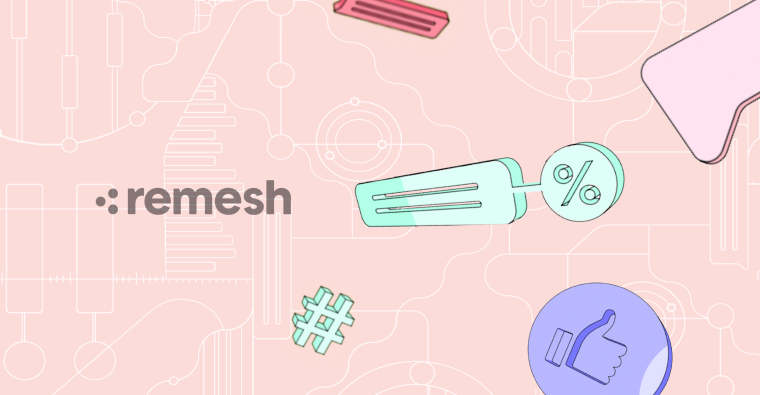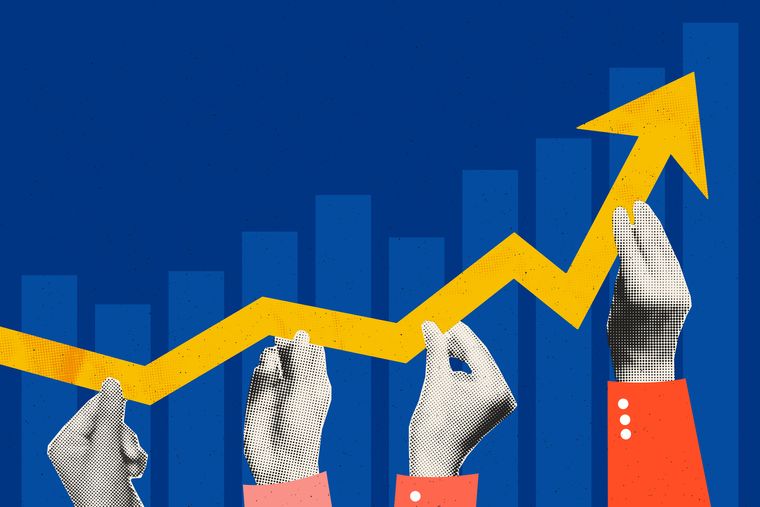Global insight perspectives
Unique perspectives on a spectrum of topics impacting research and insights, from innovation and leadership to trust and disruption.

Article series
Insight250
- The importance of business sense in research
- The role of humour in effective leadership
- The importance of ethics
- The importance of disruption in innovation and leadership
- The importance of Disruption in Innovation and Leadership Part 2
- The importance of Diversity & Inclusion
- The impact of colour
- Communicating insight with impact
- Insights on leadership, culture and polling
- The evolution of electric vehicles
- 2022 Top tips (part 1)
- 2022 Top tips (part 2)
- Maximising the potential of data
- The importance of flexible working
- Winners
- The importance of advanced analytics
- Judges for the 2022 Insight250 Awards announced
- The evolution from social listening to digital intelligence
- The Judges' Perspective
- The judge's perspective - part 2
- Insight Climate Collective
- Insights technology
- Understanding employee ownership
- Global insight perspectives
- Top Tips from our Leaders and Innovators
- The Evolution of Insights in the Food & Beverage Market
- The Evolution of Insights in CPG
- Neural Mechanisms Behind Consumer Decision-Making
- Celebrating and Elevating the Insights Industry
- The State of the Insights Industry
- Opportunities, challenges and threats that AI presents
- 2024 Insight250 Winners Announcement
- Connecting Brands and Consumers Through Insights
- The Importance of Human Insight and Attention
- The Elevating Role of Insights with Technology Innovation
- Haleon’s Insight Expert on Consumer Healthcare
- Insight from the Insight250: How AI is Impacting Qualitative Research
- How AI Tech is Doing the ‘Heavy Lifting’ for Insights
- Reviewing the top tips for 2025
- Google's Sarah Ashley on AI and revolutionising insights - Insights from the Insight250
- Beyond BI: The Future of Decision Intelligence for Insight Professionals
- The Advancement & Impact of Insights - An Insight250 Winners Series perspective with David Smith
- International Jury for the 2025 Insight250 Awards Announced
- Newly elected President, Anne-Sophie, on Revolutionizing the Impact of Insights
- Haleon's Litthya Baez on Enhancing Healthcare with Insights - Insight250 Winners Series
- Understanding the Insights of Consumer Decisions
- Moving Beyond Dashboards to Deliver Decisions with AI
- How AI is Transforming Insights
- How AI is Transforming Insights
- Five Years of Insight250: Elevating the Insight Industry
The Insight250 spotlights and celebrates 250 of the world’s premier leaders and innovators in market research, consumer insights and data-driven marketing. The inaugural list was revealed last April and created renewed excitement across the industry whilst strengthening the connectivity of the market research community.
With so many exceptional professionals named to the Insight250, it seems fitting to tap into their expertise and unique perspectives across an array of topics. This weekly series does just that, inquiring about the expert perspectives of many of these individuals in a series of short topical features.
This edition is a special one that features three exceptional leaders in research and insights from three different continents - Shirley Ng, Research Principal for the Asia Pacific, Europe and Russia markets for General Motors, from China, Mariela Mociulsky, Chief Executive Officer for Trendsity, from Argentina and Tony Costella, Director of Global Consumer & Market Insights for Heineken, from The Netherlands.
I sat down with these three experts to get their unique perspectives on a spectrum of topics impacting research and insights, from innovation and leadership to trust and disruption. This is an eye-opening discussion of an array of topics and issues that are impacting global industries and local markets alike.
Why do you believe innovation and leadership are so important in business? What great examples do you see?
“Leadership in innovation and elsewhere is about doing the right things, which usually means having a clear vision of where you want to go (with a long-term focus) and the values you stand for. Then, when difficult decisions come up every day, the organisation knows what the right thing to do is.
“There have been many great opportunities to demonstrate leadership recently, through the COVID pandemic, and more recently, with the war in Ukraine. The strong leaders are those that are not willing to compromise on their vision or values, and everyone around them is confident in that.”Tony Costella
“We know, talking about innovation implies analysing and understanding change. Obviously, our task is to encourage a prospective look as we try to seek change with enough precision to be ahead of it. As we know, we are currently experiencing a major change in the paradigm as a result of the fourth evolution in knowledge accelerated by the pandemic. This is generating new habits, motivations and priorities.
“We are facing challenges such as learning the realities of the Internet 3.0, understanding the metaverse and NFTs. There are many keys to understanding the future of mobility, education, entertainment and work.”
Mariela Mociulsky
“Great leadership can guide an organisation that is going through difficult times, as we see in the current COVID situation, putting employees’ welfare at the centre of their decision making, even if it means putting people on furlough for extended periods.
“At the same time, a great leader is not intimidated to make the tough decision, no matter how unagreeable it might seem to outsiders (like the media, or well-meaning laymen who do not know your business or how those decisions were made). A good example would be my company’s CEO Mary Barra, who is turning the company to embrace zero-emission standards with new products that are not currently prominent yet in the market, like a pure BEV (battery EV).”
Shirley Ng
Where do you see leadership or innovation lacking?
“When everyone just comes into work, as usual, managing a downwardly spiralling business, this is where leadership fails. When employees are afraid to speak freely or raise questions, this is when innovation stops.”
Shirley Ng
“When the vision (or values) are lacking, so often is innovation. If there’s not a clear direction, then often innovation strategy becomes me-too projects or a splatter-gun approach.”
Tony Costella
“Innovation has to be constant, and our task is to be a rudder to navigate these changes. But speed must compliment precision in order to address this growing tangled web of information.”
Mariela Mociulsky
With the rise of AI allowing tasks to be completed more rapidly and facilitating the holy trinity of “better, faster, cheaper,” what watches do you have on “speed vs accuracy”, and is robust methodology still important?
“It is not a trade-off. We want both speed and accuracy. New technology, like AI, can help address a quicker turnaround for results, with data visualisation as part of its output. As curious researchers deal with fast-changing trends in the industry, automotive product development is by default “slower” because it takes a lot longer to put a new car or truck out on the road with many reviews and testing processes. Budget management also forces us to look for new research approaches, and we do spend time listening to new and innovative practices externally. We revisit our own methodologies often. Ultimately, at our company, the accuracy of data is non-negotiable.”
Shirley Ng
“I fully agree, the days of having to choose between quality, cost and speed (we were always told, we could have two of the three!) are over. Now the base expectation is to achieve all three. There can be no compromise on accuracy – bad data and conclusions lead to wrong decisions, wasted investments and lost opportunities. We are not looking for tech that ‘cuts corners,’ we are looking for tech that does at least as good a job of analysis, but in real-time.”
Tony Costella
AI vs the human brain, is a human still required in data analysis anymore?
“AI is a great technology that can save time and provide data visualisation very quickly, as in a chart, as long as the datasets are available to the tool. It can retrieve data from massive archives that allows us to visualise information much faster than manual extractions. However, that should not be the end of data analysis. The human brain has the capability of re-experiencing events from lingering memories. So, when we see a data point that reminds us of a past similar event, this memory can trigger a cascade and allows related experiences to echo. That is something we call “insights.” To summarise, AI as a new tech should be a great assistance to allow quick data visualisation, but it is the human brain that re-experiences and re-combine information through creative imagination.”
Shirley Ng
“AI is a tremendous tool for analysis – it can help find patterns and correlations that we might never have even thought to look for. However, it is an aid, not a replacement for thinking and human judgment. A great model that gives ‘better’ results but is a ‘black box’ is very dangerous. There have been many examples of this – not least in trading algorithms that can outperform humans in the short term – but if we do not understand why that’s the case, it could always be for bad reasons or based on the very specific data used to train the model – that does not hold at some point.”
Tony Costella
How do you choose and decide to leverage a new tool and know that it is the latest technology and that it is innovative?
“Many vendors reach us monthly on “new approaches to research.” Ultimately, I do not deliberately look for “new” per se. With more than 25 years of market research experience across three different sectors (automotive, CPG, technology), I have seen many overlaps in methodologies.
“New is not necessarily better, whether it is innovative or not depends on the design of the instrument. Sometimes I’ve seen proposals that would get you the same results compared to practice of record, but a bit faster in turnaround time. I don’t call this “innovative”, though. But, I have come across a few proposals that inspired me, but I won’t get into those specifics on who offers this and how it is done at this forum.”
Shirley Ng
“The world is moving away from centralised research toward open innovation. We need to work in a collaborative manner. This is related to the creation of innovation ecosystems in which multiple areas of knowledge and expertise come together to generate innovation that is relevant and has a positive impact.”
Mariela Mociulsky
“I agree. While I’m always open to hearing of new technology and approaches, it’s rare that a great solution suddenly arises for a problem you didn’t know you had. I really don’t care whether a solution is the ‘latest technology.’ I care whether it improves an existing solution or solves a problem I have today.”
Tony Costella
Do you see particular markets globally that we can learn from?
“We’re global – so not looking to certain regions or countries for solutions (either in terms of MR tech or new trends in the beverages industry). We’re a very decentralised organisation, so always looking for great local trends or tools that can be scaled.”
Tony Costella
“The key is rethinking research as a social actor that collaborates in innovation with a positive impact on the world and people. The challenge for us is to be able to occupy this world.”
Mariela Mociulsky
With data and evidence becoming increasingly important, our profession has a critical role to play in maintaining trust and integrity with information - what more should we be doing to build trust?
Tony: “This is always a difficult topic to get the balance right. On the one hand, we constantly tell managers to have an opinion - to go beyond the data to interpret it and make clear recommendations. On the other, as you say, we need to be crystal clear on when we are giving opinions vs when we are providing facts. There is room (necessity and expectation even) to provide both – we need to take care to differentiate though so that we can maintain full credibility and trust, while also going beyond the pure facts to be able to drive decision-making.”
Tony Costella
“Trust is built over time, internally at the company, or externally with the customers. Internally, a market research member should be able to bring insightful learnings from customers (outside-in data), and stakeholders look at us as a reliable compass to guide decision making.
“Externally, we need to earn that trust from customers, and make sure that what the brand promises to offer is a) what they get and exceeds their expectations, and b) the execution is not easily broken, that means reliability stands behind the brand’s products. This is how I interpret “trust.”
Shirley Ng
How important do you think it is for us to be bold and brave as business professionals?
“Exploration requires boldness. It is to trust your own informed decision making and bring a business to higher heights, even when the current status is already successful. Bravery is to take that calculated risk and go forward with a new plan to spaces where you had not ventured into before. This also means you are taking a lot of livelihoods along with you on that journey of change. That takes guts.”
Shirley Ng
“It is critical to be bold. We constantly talk about the role of Insights managers being not just to inform but to inspire and provoke the business. At first, this can be daunting and, if not managed well, can feel like you’re challenging or being disruptive. Often the key is to engage with more senior stakeholders who don’t just appreciate this, but fully expect it of the Insights department.”
Tony Costella
What do you see as the next big disruption for our industry?
“I’m not foolish to tell you what I think will be next, but more of what I hope. I hope AI really begins to deliver the promise. Going beyond basic data modelling (which is helpful but still relatively simple) – too true ‘machine learning’ on complex, unstructured data. When I can feed in an entire history of concept tests and recommendations – and a machine can start producing new, better concepts for me to build from or automatically generate clear recommendations for a new test – may be pointing out some links and opportunities for improvement I wouldn’t spot myself.”
Tony Costella
What do you see as the biggest challenges to research appearing on the horizon?
“The rapid pace of change in trends and product development in the auto business. Recognise what is hype and what is here to stay. There are many hypes today pushed by multiple media channels.
“We are very careful about what publications we bring into the organisation, and we need to spend more time evaluating this input with a shrinking headcount. That is an extra layer of tedious work that we did less in the past decade or two.”
Shirley Ng
“I see two in particular: (i) trust – as discussed earlier, in the era of fake news, and freely available bad data, how to ensure people do still listen to good data when it’s there and (ii) losing the why – with the ever-increasing pipe of behavioural data, people are too ready to listen to black-box analyses that give clear recommendations without understanding why. We can quickly end up in a race to measure and optimise everything – doing things really well, but not necessarily spotting that we should be doing something else altogether.”
Tony Costella
Thank you all so much – a huge amount to reflect on for all of us. I’m still processing Shirley’s comment, “AI as a new tech should be a great assistance to allow quick data visualisation, but it is the human brain that can re-experience and re-combine information through creative imagination” – so important to remember that AI is an enabler and not a panacea and that we as professionals still have a huge role to play in delivering insights. I always agree wholeheartedly with Tony’s challenge to us to be “bold”. I first spoke to Tony, Shirley and Mariela about these and other topics for the MRS 2022 Impact Conference, and if you want to hear more from these inspiring leaders, the content is still available via this link https://www.mrsannualconference.com/programme.
Thank you all again for sharing your perspectives.
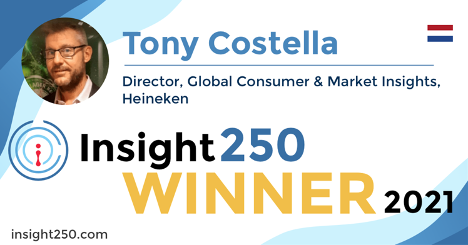 As Director of Global Consumer & Market Insights for Heineken, Tony Costella has extensive experience in building data analytics, behavioural economics, consumer research and business insights. He is also responsible for the global consumer and market insight capabilities. Previously he held strategy and intelligence roles with Mastercard, RB and Procter & Gamble.
As Director of Global Consumer & Market Insights for Heineken, Tony Costella has extensive experience in building data analytics, behavioural economics, consumer research and business insights. He is also responsible for the global consumer and market insight capabilities. Previously he held strategy and intelligence roles with Mastercard, RB and Procter & Gamble.
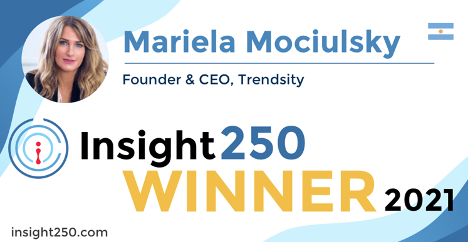 Mariela Mociulsky founded Trendsity in 2007 and leads the company as its Chief Executive Officer. She has over 20 years of experience leading teams and projects for leading brands. She is also the President of the Argentine Society of Researchers and has been a lecturer at the University de San Andres, University of Palermo and University Siglo XXI.
Mariela Mociulsky founded Trendsity in 2007 and leads the company as its Chief Executive Officer. She has over 20 years of experience leading teams and projects for leading brands. She is also the President of the Argentine Society of Researchers and has been a lecturer at the University de San Andres, University of Palermo and University Siglo XXI.
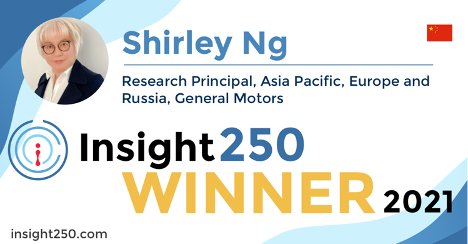 For nearly 10 years, Shirley Ng has held strategic insights and research roles for General Motors and currently serves as Research Principal for the Asia Pacific, Europe and Russia markets. She has previously been in leadership roles for Microsoft and Procter & Gamble. She also holds a PhD in business organisation management.
For nearly 10 years, Shirley Ng has held strategic insights and research roles for General Motors and currently serves as Research Principal for the Asia Pacific, Europe and Russia markets. She has previously been in leadership roles for Microsoft and Procter & Gamble. She also holds a PhD in business organisation management.
Crispin Beale
Chairman at QuMind, CEO at Insight250, Senior Strategic Advisor at mTab, CEO at IDXCrispin Beale is a marketing, data and customer experience expert. Crispin spent over a decade on the Executive Management Board of Chime Communications as Group CEO of leading brands such as Opinion Leader, Brand Democracy, Facts International and Watermelon. Prior to this Crispin held senior marketing and insight roles at BT, Royal Mail Group and Dixons. Crispin originally qualified as a chartered accountant and moved into management consultancy with Coopers & Lybrand (PwC). Crispin has been a Board Director (and Chairman) of the MRS for nearly 20 years and UK ESOMAR Representative for c15 years. As well as being CEO of Insight250, Crispin is currently Worldwide CEO of Digital Communications Solution Agency, IDX. Crispin is also the Senior Strategic Advisor at mTab and the Chairman of QuMind and spent 4 years as Group President of Behaviorally where he was responsibile for the client & commercial teams globally. Crispin is a passionate advocate for blending human intelligence and technology to deliver innovation and leadership across organisations.
Article series
Insight250
- The importance of business sense in research
- The role of humour in effective leadership
- The importance of ethics
- The importance of disruption in innovation and leadership
- The importance of Disruption in Innovation and Leadership Part 2
- The importance of Diversity & Inclusion
- The impact of colour
- Communicating insight with impact
- Insights on leadership, culture and polling
- The evolution of electric vehicles
- 2022 Top tips (part 1)
- 2022 Top tips (part 2)
- Maximising the potential of data
- The importance of flexible working
- Winners
- The importance of advanced analytics
- Judges for the 2022 Insight250 Awards announced
- The evolution from social listening to digital intelligence
- The Judges' Perspective
- The judge's perspective - part 2
- Insight Climate Collective
- Insights technology
- Understanding employee ownership
- Global insight perspectives
- Top Tips from our Leaders and Innovators
- The Evolution of Insights in the Food & Beverage Market
- The Evolution of Insights in CPG
- Neural Mechanisms Behind Consumer Decision-Making
- Celebrating and Elevating the Insights Industry
- The State of the Insights Industry
- Opportunities, challenges and threats that AI presents
- 2024 Insight250 Winners Announcement
- Connecting Brands and Consumers Through Insights
- The Importance of Human Insight and Attention
- The Elevating Role of Insights with Technology Innovation
- Haleon’s Insight Expert on Consumer Healthcare
- Insight from the Insight250: How AI is Impacting Qualitative Research
- How AI Tech is Doing the ‘Heavy Lifting’ for Insights
- Reviewing the top tips for 2025
- Google's Sarah Ashley on AI and revolutionising insights - Insights from the Insight250
- Beyond BI: The Future of Decision Intelligence for Insight Professionals
- The Advancement & Impact of Insights - An Insight250 Winners Series perspective with David Smith
- International Jury for the 2025 Insight250 Awards Announced
- Newly elected President, Anne-Sophie, on Revolutionizing the Impact of Insights
- Haleon's Litthya Baez on Enhancing Healthcare with Insights - Insight250 Winners Series
- Understanding the Insights of Consumer Decisions
- Moving Beyond Dashboards to Deliver Decisions with AI
- How AI is Transforming Insights
- How AI is Transforming Insights
- Five Years of Insight250: Elevating the Insight Industry

